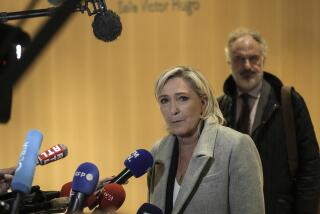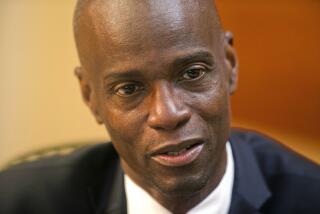Fabius Challenges New Zealand to Offer Proof of French Guilt in Bombing of Ship
- Share via
PARIS — French Premier Laurent Fabius, accepting the findings of a controversial official report, challenged New Zealand authorities Tuesday to produce evidence that French agents are guilty of sinking the Greenpeace ship Rainbow Warrior in Auckland harbor.
Despite a growing mood of skepticism within France, Fabius told a crowd of reporters and television cameramen in a gilded room of his offices that he has no evidence to contradict the conclusion of special investigator Bernard Tricot that France is innocent.
Fabius did add, however, without explanation, that he was not satisfied with the control exercised by the French government over intelligence matters.
Tricot is a respected conservative who was chief of staff of the administration of President Charles de Gaulle almost 20 years ago. He concluded in a report released Monday that five French agents, arrested or sought by New Zealand police in the explosions that sank the Rainbow Warrior, were sent to New Zealand to put Greenpeace and its ship under surveillance but not to sink it.
Many French newspapers reacted with skepticism. Le Monde, France’s most influential paper, ran two stories on its front page about the report, one headlined “Doubts,” the other “Shams.”
Liberation, another Paris daily, mimicked the slogan of a detergent and headlined its account, “Tricot Washes Whiter.” Both newspapers are usually sympathetic to the Socialist government of President Francois Mitterrand.
The reaction from New Zealand was much sharper as Prime Minister David Lange condemned the report as “utterly incredible,” demanded an apology from the French government for the July sinking and suggested that France recall its ambassador.
Far from apologizing, Fabius, appointed premier by Mitterrand a year ago, was defiant in proclaiming that France has the right to spy on an organization like Greenpeace that was trying to disrupt French nuclear testing in the South Pacific.
Greenpeace, an activist group devoted to environmental issues, was sending the Rainbow Warrior and a flotilla of smaller vessels on a protest mission into the French testing site at Mururoa Atoll.
“As a nuclear power and as a Pacific power,” Fabius said, “we have to defend what we believe are the interests of France in that region. Since there are schemes against our interests, no one, especially those who encourage such schemes, should be astonished that we are vigilant in protecting these interests.” He presumably was referring to New Zealand, which the French have accused of encouraging Greenpeace.
Curiously, Lange chose to view Fabius’ hard-line remarks as “not an apology in any specific sense but very conciliatory.” In a radio interview, Lange said the statement was “ . . . the closest to a constructive apology that we are going to get.” At a press conference later, Lange said the French premier’s remarks were significant because they acknowledged serious deficiencies in the French intelligence service. Lange, however, stopped short of promising to meet Fabius’ request that New Zealand send Paris all its evidence on French participation in the Rainbow Warrior incident.
With his firm declaration, Fabius seemed intent on striking a patriotic chord in France. While there was a good deal of skepticism about the Tricot report in the French press, no editorial page, except that of the Communist Party paper, ridiculed it.
A number of conservative politicians, moreover, seemed reluctant to criticize the Socialist government on an issue that involved both French intelligence and French nuclear power.
Former President Valery Giscard d’Estaing, meeting with young members of his center-right party, issued a statement saying he intends to abstain from all statements on the affair. “Whether it be wrong or whether it be right,” the former president said, “it is my country.”
Fabius, in his statement, said it is now up to New Zealand to communicate to France all information it has on the Greenpeace affair.
“If it appears,” the premier said, “that some criminal acts have been committed by some French, legal proceedings will be immediately started. The French government is determined that no element of the case stays in the shadows.”
French Agents Charged
The New Zealand authorities have arrested two French intelligence agents and charged them with murder, arson and conspiracy in the case.
Three other French intelligence agents--frogmen who had been seen in a sailboat in Auckland harbor shortly before the explosion--turned themselves in to French police in Paris on Monday. The three were immediately released, with French authorities saying the New Zealand warrants seeking their arrest lacked evidence. Under French law, in any case, a French citizen cannot be extradited to another country.
In his statement, Fabius did not maintain that the French government was sitting back complacently on the strength of the report. Instead, he ordered a new investigation of “important lacks in the functioning” of the French intelligence agency and a new series of reports to the French Parliament on intelligence activities.
These actions, however, were a far cry from the changes expected in the last two weeks when French newspapers ran almost daily disclosures that seemed to prove official French involvement in the bombing, in which two mines were detonated after midnight July 10. One person, a Portuguese-born photographer, was killed in the explosion.
Many newspapers had predicted that either Minister of Defense Charles Hernu or Adm. Pierre Lacoste, the head of the French intelligence agency known as the General Directorate of External Security, or both would be dismissed.
Hernu Told to Investigate
Instead, Fabius ordered Hernu to investigate the “important lacks” in the intelligence agency and remedy them. Fabius, who refused to answer any questions after reading his statement, did not explain the nature of these shortcomings.
But Tricot, in his report, had said he was concerned about a confusion that sometimes slipped into orders, especially verbal ones, as they were handed down from one level of the agency to another.
Again without explaining specifically what he had in mind, Fabius said the question of controlling the intelligence agency “does not seem satisfactory to me.” He said he therefore instructed the defense and intelligence ministers to send an annual report to the heads of the defense committees of both houses of Parliament detailing the intelligence activities of each ministry.
In discussing the Tricot report, Fabius noted that, while it absolved the French government and its agents of blame, it did not accuse anyone else.
“The identification of the authors of the attack have still not been made,” the premier said. “We hope that the New Zealand authorities come up with the truth as soon as possible.”
More to Read
Sign up for Essential California
The most important California stories and recommendations in your inbox every morning.
You may occasionally receive promotional content from the Los Angeles Times.













